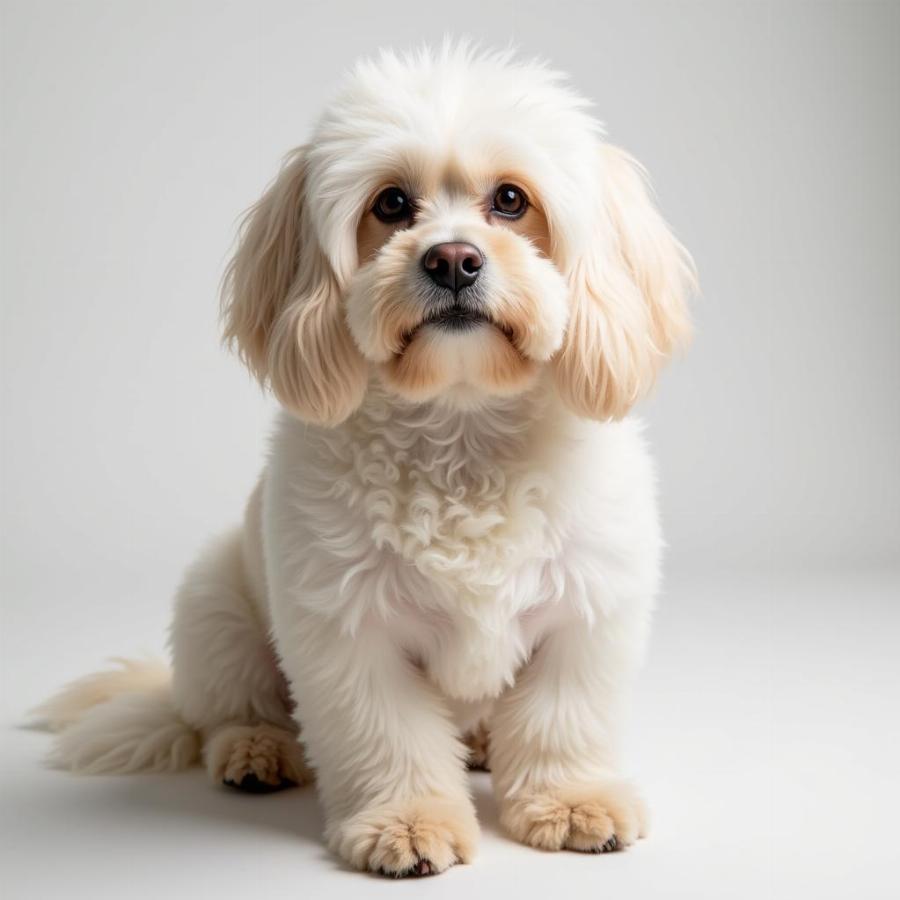So you’re dreaming of a curly haired dog that fits in a purse – a tiny, adorable companion to brighten your days? You’re not alone! These pint-sized pups are undeniably charming, but finding the right breed for your lifestyle requires careful consideration. This comprehensive guide explores everything you need to know about these pocket-sized pals, from popular breeds to essential care tips.
Understanding the Appeal of “Purse-Sized” Pups
The idea of a dog small enough to tuck into your purse is undeniably alluring. These miniature companions offer a unique blend of portability and companionship, making them appealing to a wide range of people, especially those living in apartments or with limited space.
However, it’s crucial to remember that even the smallest dog is a living creature with specific needs and temperament. While the term “purse-sized” is often used lightheartedly, it’s essential to prioritize the dog’s well-being over the desire for a fashionable accessory.
Popular Curly Haired Breeds for Your Consideration
Let’s dive into some of the most popular curly-coated canine contenders that capture the hearts of dog lovers everywhere:
1. Bichon Frise: The Powder Puff Companion
Known for their cheerful disposition and cloud-like appearance, Bichon Frises are small dogs with big personalities. Their hypoallergenic, powder puff-like coats require regular grooming to prevent mats and tangles. Bichons are generally adaptable and make wonderful companions for individuals and families alike.
2. Poodle (Toy and Miniature): Elegance in a Small Package
Poodles are renowned for their intelligence, elegance, and hypoallergenic, low-shedding coats. While standard poodles are too large for a purse, Toy and Miniature Poodles fit the bill perfectly. These pups require regular grooming and mental stimulation to thrive.
3. Bolognese: The Rare Italian Charmer
 Bolognese Dog with Long White Fur
Bolognese Dog with Long White Fur
This ancient Italian breed boasts a luxurious, white, curly coat that resembles spun cotton. Bolognese are affectionate, playful, and relatively rare. They thrive on human companionship and prefer a calm environment, making them suitable for individuals or families with older children.
Essential Care for Your Curly Coated Canine
Caring for a curly haired dog differs significantly from caring for breeds with straight or short coats. Here’s what you need to know:
Grooming: Regular brushing is essential to prevent mats and tangles. Invest in high-quality brushes and combs specifically designed for curly coats. Many owners opt for professional grooming every 4-6 weeks to maintain the coat’s health and appearance.
Bathing: Bathe your curly haired dog every 2-3 weeks, or as needed, using a gentle, pH-balanced shampoo and conditioner formulated for dogs. Avoid over-bathing, as it can strip the coat of its natural oils, leading to dryness and frizz.
Diet and Exercise: Provide your dog with a balanced diet specifically formulated for its breed, age, and activity level. Regular exercise is crucial for both physical and mental stimulation. Even small breeds need daily walks and playtime.
Training and Socialization: Early training and socialization are crucial for any dog, especially small breeds. Enroll your puppy in obedience classes and expose it to various sights, sounds, and experiences to help it develop into a well-adjusted adult dog.
Choosing the Right Breed for Your Lifestyle
While the allure of a curly haired dog that fits in a purse is undeniable, choosing the right breed for your lifestyle is paramount. Consider your living situation, activity level, and experience with dogs.
Ask yourself:
- Can I provide adequate exercise and mental stimulation for an active breed?
- Do I have experience with grooming-intensive dogs?
- Am I prepared to handle potential health concerns associated with certain breeds?
Conclusion
Finding the perfect curly haired companion is a rewarding experience. By understanding the needs and characteristics of different breeds and committing to responsible ownership, you can welcome a loving, furry friend into your life. Remember, the most important factor is finding a dog that complements your lifestyle and brings you years of joy.
FAQs
1. Are curly haired dogs hypoallergenic?
While no dog is truly hypoallergenic, curly haired breeds like Bichon Frises and Poodles produce less dander, making them a popular choice for people with allergies.
2. How often should I groom my curly haired dog?
Curly haired dogs require regular brushing, ideally daily, to prevent mats and tangles. Professional grooming every 4-6 weeks is also recommended.
3. Are curly haired dogs good with children?
Many curly haired breeds, such as Bichon Frises, are known for their gentle nature and can be good with children when properly socialized and supervised.
4. Are curly haired dogs prone to any health problems?
Like all breeds, curly haired dogs can be prone to certain health issues. It’s essential to research breed-specific health concerns and choose a reputable breeder.
5. Where can I find a reputable breeder of curly haired dogs?
Reputable breeders prioritize the health and well-being of their dogs. Look for breeders who perform genetic testing, provide proper socialization, and are knowledgeable about the breed.
For personalized guidance and expert advice on finding the perfect curly haired companion for your lifestyle, contact Beaut Dogs** at [email protected]. We’re here to help you navigate the world of dog ownership with confidence!
Beaut Dogs is your ultimate resource for all things dog-related. We provide reliable, insightful, and in-depth information about the wonderful world of dogs, covering a vast array of breeds, from the common to the rare and exotic.